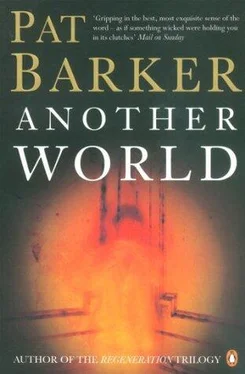‘Is there anything you need doing while I’m here?’ he says, hovering in the kitchen door while she slaps butter on to bread.
‘You could change the bulb on the landing if you wouldn’t mind.’
Of course he doesn’t mind. He’s relieved to be doing something that only he can do. He gets the stepladder, says, as Grandad always said at such moments, in his younger days, ‘Let there be light,’ and there was light. He puts the stepladder back in the bedroom and goes down to eat.
When she comes in with the sandwiches on a tray they talk about Geordie and his illness, Frieda reproaching herself for not having spotted the signs sooner. She seems to think if only she’d got him to the doctor more quickly he might have lived for ever. Once or twice Nick notices slips of the tongue: she talks about ‘your dad’ when she means her dad. Tiredness — she must be absolutely knackered. ‘Grandad,’ he corrects, gently, but then thinks, Why bother? She’s only unconsciously recognizing a truth.
When his father died, Nick stood by the grave, eyes stinging, not from grief, but from a kind of despair at his failure to feel anything. His deepest reaction had been one of relief: that he wouldn’t have to try to talk to him any more. Cars and cricket, cricket and cars. They’d sit on either side of the fire during Nick’s disgracefully rare visits, like a couple of bookends with no book worth reading in the middle.
Once the sandwiches have been eaten and the tray taken away, he asks, ‘How bad are the nights?’
He sees her hesitate, the struggle between loyalty and desperation painful to witness. ‘Bad,’ she says at last.
‘Nightmares?’
‘Worse than that. He wakes up and it’s still happening. I can remember him being like this when I was a little girl. I used to stand at the kitchen door and watch your gran try and get him back into the house. But he’d got over it, that’s what I can’t understand. He hasn’t had turns like that for years. And now it seems like it’s all coming back. You know, he thinks he sees Harry being killed. But the thing is, it’s not like he’s remembering it, it’s like he’s actually seeing it. He’s shouting “Harry” and waving his arms about and when you get hold of him he doesn’t see you, he’s in a world of his own. To be honest I’ve been frightened of him once or twice and it’s an awful thing because he never once lifted a finger to any of us when I was little. He was never a violent man.’
‘Look, when he comes out, I’ll do the nights.’
‘You can’t,’ she says immediately. ‘When’s the baby due?’
‘Not till October. I can manage the first few weeks.’ To himself he’s thinking (hoping?) that a few weeks may be all that’s needed. Shepherd said he could go any time. ‘You need your rest,’ he says. ‘You can’t do nights and days.’
She blinks doubtfully. ‘Well, if you’re sure. I can’t say it wouldn’t be a help, ’cos it would.’
On his way back to the hospital, Nick calls at Geordie’s house to check that everything’s all right. It’s typical of Geordie that he won’t surrender his independence and go to live with his daughter, though there’s never a week goes past that Frieda doesn’t try to persuade him. ‘No,’ he says. ‘I’m all right as I am.’
And until recently he was. He lives in a terrace of two-up, two-down houses, in what used to be a poor district, though now it’s rising rapidly as young professional people move in. It’s an attractive area, only a short drive from the city centre, yet the houses back on to woods and fields.
The house smells cold, musty and unlived in, though Geordie’s only been in hospital a week. Nick checks the windows and the back door, but everything’s secure. He goes upstairs, switches on the light in Grandad’s bedroom, not knowing what he’s doing here. Wanting some contact perhaps, some feeling of closeness that he doesn’t get from that semi-stranger in the hospital bed.
Two books on the bedside table. One’s called Soldier, from the Wars Returning and includes an interview with Geordie, though that’s not why it’s there. It’s there because of the inscription on the title page, To Geordie, with love and admiration, Helen .
The other’s a scrapbook for cuttings of his public appearances. Not many recent cuttings, only one in the last three months, but before that they come thick and fast. Grandad at the Imperial War Museum, talking to children in schools and colleges, on a televised trip to the battlefields, framed by the arches of Thiepval. The record of an ordinary man who, by living long, had become extraordinary.
On the table beside the wardrobe there’s a photograph of two young men in uniform, not obviously brothers, though they were brothers. Tinted sepia, drained of life and colour, as if the mud’s already reaching out to claim them. Born to die, that’s the impression, though only one of them did. Harry’s the one who copped it, dead in 1916, just before the Somme. Yet in the photograph the shadow of what’s to come seems to lie over them both. Eighteen years old, a self-conscious moustache framing his upper lip, Grandad looks closer to death than he did this afternoon, 101 years old, riddled with cancer, lying in a hospital bed.
Beside it there’s another photograph, a glossy Polaroid taken by Nick on a visit they’d made, earlier this year, to the battlefields. The last week of February, snow on the ground. No time for a man of Geordie’s age to be travelling, but they both knew this would be his last time, and that if they didn’t seize the chance to go together then, they would never go at all.
Grandad’s last, Nick’s first, visit. He’d resisted this for years, but now couldn’t refuse. At intervals, as once when Grandad stood on the lip of a crater, looking down, it strikes Nick with the force of revelation, though he’s known it all his life: he was there .
Nothing Nick had heard, nothing he had read, prepared him for the cemeteries. He wandered round, taking surreptitious photographs of Geordie, neither of them speaking much, content to leave each other alone. They visited the cemeteries promiscuously, in no particular order. One of Nick’s clearest memories is of Geordie standing in a German cemetery, the thin dark crosses casting blue shadows on the snow, like the footprints of birds.
Just as nothing had prepared him for the cemeteries, so the cemeteries, with their neatly tended plots and individual inscriptions, failed to prepare him for the annihilating abstractions of Thiepval. Geordie walked in a straight line towards the monument, dwarfed by its immensity, his figure shadowy in the faint mist that lingered on the grass. Nick retreated to a curved stone bench, ignoring the damp seeping through the seat of his jeans, and stared at the inscription: TO THE MISSING OF THE SOMME.
He was repelled by it. The monument towered over the landscape, but it didn’t soar as a cathedral does. The arches found the sky empty and returned to earth; they opened on to emptiness. It reminded Nick, appropriately enough, of a warrior’s helmet with no head inside. No, worse than that: Golgotha, the place of a skull. If, as Nick believed, you should go to the past, looking not for messages or warnings, but simply to be humbled by the weight of human experience that has preceded the brief flicker of your own few days, then Thiepval succeeded brilliantly.
Following in Geordie’s footsteps, he walked across the grass and up the steps to the stone of sacrifice, feeling the weight of that experience heavy on the back of his neck. Above him, on the vast flat surfaces the complex structure was designed to provide, were columns of names, stretching up precisely as far as the eye could see. Through the arch was yet another cemetery. ‘Inconnu’ on the French crosses, ‘Known Unto God’ on the British stones. Out there were the graves of men whose bodies had become separated from their names; inside the monument thousands of names that had become separated from anything at all. A scrap of blue or khaki cloth. A splinter of charred bone. Nothing else remained. Echoing footsteps, lists of names, arches opening on to emptiness. It seemed to Nick that this place represented not a triumph over death, but the triumph of death.
Читать дальше












